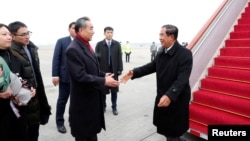Cambodia and China issued social media statements on Monday announcing the conclusion of their free trade agreement negotiations and that the trade deal will be mutually beneficial for the geopolitical allies.
The Cambodian Ministry of Commerce and Chinese Embassy in Phnom Penh posted on Facebook that they had officially announced the conclusion of negotiations on Monday, during a video conferencing call between Commerce Minister Pan Sorasak and his Chinese counterpart, Zhong Shan.
“The two countries have concluded the free trade agreement which has a lot of benefits,” reads the Chinese Embassy’s statement posted on Facebook. “[I]t is a new impetus in speedily building a shared, future community between China and Cambodia in a strategic [manner].”
The Cambodian Commerce Ministry posted on Facebook that the FTA was an extension of the “long-standing relations” between the two countries and reflects the intent of the two leaders, Prime Minister Hun Sen and President Xi Jinping.
Hun Sen is expected to visit Beijing on August 12 to sign the new agreement, which is Cambodia’s first FTA with a foreign country, according to government officials. The agreement is expected to focus on increasing Cambodian agricultural exports, said experts in early July.
The FTA comes as Cambodia is expected to partially lose its tariff-free access to the European Union on August 12, and as Beijing has increased its influence in the country, especially through increased investment and geopolitical support against the West.
Phay Siphan, a Council of Ministers spokesperson, said the FTA was another economic benefit for Cambodians in the agricultural sector, adding that rice and mangoes exports will increase to China.
“I believe that this shows a shared future together in free trade, which is very important for Cambodia,” he said.
Government figures show that bilateral trade in 2018 was around $7.4 billion. Cambodia accounted for only $800 million in trade, registering a trade deficit with China, which exports large quantities of raw materials to Cambodia for the manufacturing and construction sectors.
Phay Siphan was unconcerned over the trade deficit. “[I]n the new economic era, there is no need to talk about trade deficit. We talk about value-added exports.”
On Tuesday, during a visit to Takeo province, Prime Minister Hun Sen said the government is committed to expanding rice exports to one million tons by 2021 or 2022. Hun Sen added his government will utilize the COVID-19 economic crisis as an opportunity to improve agricultural exports.
He added migrant workers and those in the tourism sector, who had lost their jobs because of the pandemic, could turn to agriculture to restore their livelihoods.
“We [can] turn this crisis into the opportunity for Cambodia to expand export markets for food [products] - not only rice, but also exports of cassava, mangoes, bananas and other food products,” he said.




